

Study Confirms Project-Based Learning Has a Positive Impact on How Students Learn Science and Math - Defined STEM. 4 Steps to Better Brainstorming in PBL. Since Project Based Learning involves answering an open-ended challenge or question, students will inevitably need to leverage brainstorming strategies during a project to consider possibilities and develop ideas.
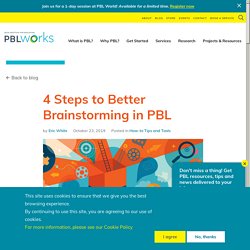
However, some suggest that we’ve been completely missing the mark with brainstorming, and I tend to agree with many of the assertions. My first few attempts at facilitating brainstorming sessions with students yielded lackluster results. That’s my diplomatic way of saying that they were painfully lame and uninspiring. To be clear, this was not the students’ fault but mine as the facilitator. I hurriedly formed teams, gave them a bunch of brightly colored markers and chart paper, cranked up some energetic music, and I even yelled out cliché catchphrases like, “Be creative!” But, at the end of those sessions, we often had little to show for it (aside from all the wasted paper). Here are four steps to better brainstorming. Step 1: Focus Before You Flare Step 2: Seek Solitude.
Project Based Learning and Presentations. To make learning during the process visible and to facilitate assessment, project-based learning culminates in a final presentation of learning.
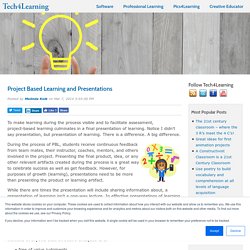
Notice I didn't say presentation, but presentation of learning. There is a difference. A big difference. During the process of PBL, students receive continuous feedback from team mates, their instructor, coaches, mentors, and others involved in the project. Presenting the final product, idea, or any other relevant artifacts created during the process is a great way to celebrate success as well as get feedback. While there are times the presentation will include sharing information about, a presentation of learning isn't a one-way lecture.
Before presentations of learning begin, share questions both presenters and audience members should be prepared to answer. Remind everyone that effective critiques are: Ideas for the Presenter(s) Begin transforming presentations into presentations of learning, by making this distinction to your students. MyPBLWorks. How PBL Connects to Research on Brain Science. Just Jump In! Parent and Community Involvement in PBL. TeachThought PD PBL Exemplar - The Straw Project Projects Vs Project Based Learning: What is the difference? – Off Road Edu Adventures. At a conference recently I was asked to reflect on what I remember learning at school. These experiences could include subjects, topics, projects, specific content or skills. I must admit, I actually found this task quite challenging (which could be a reflection on my memory). However, I do have three vivid memories, that I could recall and each one was a project.
The first was the wooden pencil box that I made in year 7. Implementing an inquiry-based teaching approach. Findings from an evaluation of upper primary and middle school students’ science inquiry skills suggest there is room for improvement in implementing an inquiry-based teaching approach, at least in terms of students’ abilities to undertake scientific inquiry.
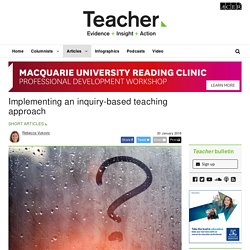
The evaluation of students from India in Class 5 to 8 (aged 10 to 14 years), conducted by the Australian Council for Educational Research (ACER) draws on data from the International Benchmark Test (IBT). IBT is a large-scale assessment for students in Class 3 to 5 in English, Mathematics and Science conducted in schools in India, the United Arab Emirates, Malaysia and South Africa. Writing in Research Developments [rd] ACER Research Fellow Abha Bhagat explains the study used IBT multiple-choice questions designed for students to assess science inquiry skills in five areas, including how to read and interpret information on a graph, identify a scientific program and drawing conclusions based on evidence.
What did the study find? Life in a 21st-Century English Class. Finally, technology is embedded into the structure of all we do.
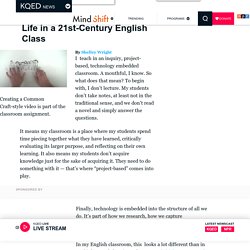
It’s part of how we research, how we capture information, and how we display our learning. It’s never an accessory tacked on at the end. In my English classroom, this looks a lot different than in my biology and chemistry classrooms (which you can read about here). My English curriculum is largely skills-based, which provides a fair amount of flexibility. 5 PBL Pitfalls to Avoid. Great ideas can lose their allure when not implemented well.
But that doesn’t make them bad ideas. Such is the case with project-based learning (PBL), a complex, powerful approach to teaching and learning that’s backed by extensive research. In my work supporting PBL implementation in schools and districts, I sometimes run into teachers and administrators who have been turned off to PBL. Their message is generally something to the effect of, “Yes, we tried PBL, but it didn’t work for us.” When I ask about what soured their experience, the answer is usually related to one of several pitfalls of poor PBL implementation. 1. The Surprising Truth About Learning in Schools. KQED Public Media for Northern CA. Chris was a shy, introverted student in my senior-level English class.
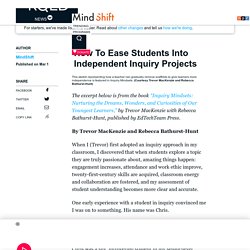
Throughout the course I saw Chris raise his hand during a class discussion only once, and it was to ask permission to use the washroom. He didn't like sharing, and he certainly didn’t come across as a confident student. Teen genius behind brilliant invention. MACINLEY Butson was only in year 6 when she came up with her first genius idea.
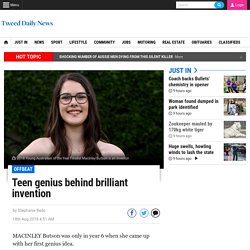
Usually kids don't want to take medicine, but Macinley was different. She realised when she took cough syrup in a measuring cup there was often some left behind and she wasn't really getting the required dose. Young Australian of the Year Macinley Butson slams Australian school system. If you’re like me, you were using MSN Messenger to try and romance your classmates, experimenting with ciggies down the local skate park and working at Woolies in the deli.
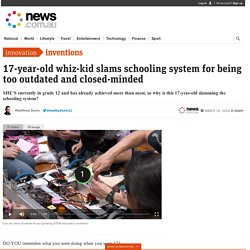
These are all great things until you spend five minutes with Macinley Butson and realise what an underachiever you are. At just 17 years old, the Illawarra Grammar School student has been named the 2018 NSW Young Australian of the Year — an honour which compliments her already long list of achievements and world-beating inventions. Among Macinley’s creations are a shield that dramatically improves protection for women from radiation during breast cancer treatment and a system that improves the effectiveness of solar panel technology. Despite being labelled “a rising star in the male-dominated world of science”, the current year 12 student said all of her projects have had to be developed as a hobby in her spare time because she receives no support from the schooling system.
“One example is chemistry class. 10 Education Truths That Support Project-Based Learning. “What I know for sure is that you feel real joy in direct proportion to how connected you are to living your truth.”
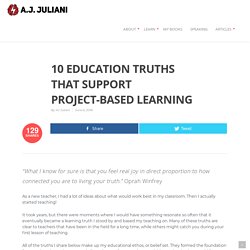
Oprah Winfrey As a new teacher, I had a lot of ideas about what would work best in my classroom. Then I actually started teaching! It took years, but there were moments where I would have something resonate so often that it eventually became a learning truth I stood by and based my teaching on. Many of these truths are clear to teachers that have been in the field for a long time, while others might catch you during your first lesson of teaching.
All of the truths I share below make up my educational ethos, or belief set. How to Raise Smarter Children. What Should Be the Teacher's Role During Project-Based Learning? Teaching is not always easy.
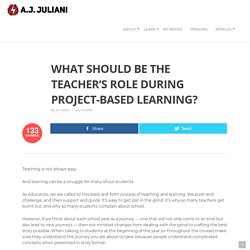
And learning can be a struggle for many of our students. As educators, we are called to this back and forth process of teaching and learning. We push and challenge, and then support and guide. It’s easy to get lost in the grind. It’s why so many teachers get burnt out, and why so many students complain about school. However, if we think about each school year as a journey — one that will not only come to an end, but also lead to new journeys — then our mindset changes from dealing with the grind to crafting the best story possible. How to lecture in a PBL classroom.
By Mike Kaechele In reading comments to John Spencer's post about The Problem with PBL I felt like people have a bit of a narrow view of PBL.
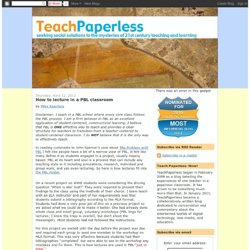
It felt like many define it as students engaged in a project, usually inquiry based. PBL at its heart and soul is a process that can include any teaching style in it including simulations, research, individual and group work, and yes even lecturing. So here is how lectures fit into the PBL model. From boring to brilliant - moving to an inquiry based classroom. Delving into some scholarly work on inquiry based learning strategies, I stumbled over this gem from one author: Any handful of these approaches will morph your classroom from passive to sparkling, from boring to brilliant. That’s sure to bring the crowds back I thought. Project-Based Learning: Raising Student Achievement for All Learners. Project-based Learning: Are You Focused on the Project or the Learning? As the Gallup poll and countless others have pointed out, many of our students are increasingly less engaged in their own education. Much of this is a result of a focus on short-term, extrinsic rewards to coax kids through low-level tasks and provide technology as games or rewards to motivate learners instead of designing authentic and personal learning experiences that draw on learner’s curiosity, passions, and interests.
I think it is important to highlight that if students aren’t motivated and inspired to solve authentic and meanigful problems, it’s not just them that misses out. It’s all of us. In case you haven’t been paying attention, we have some very real and challenging problems that we continue to face in our world. If we want to create more engaged, skilled, and empowered learners and citizens, and I would argue that we need to, we need to create experiences where they can practice and develop these competencies.
This approach is about continually adding on more and more. Resources for running a PBL workshop. I have given many, many presentations on Project Based Learning and I’ve run just as many workshops with teachers about Project Based Learning. Over the years, I have worked out what seems to be a pretty effective way of sharing my knowledge, experience and resources related to PBL. I know teachers really like getting resources and access to the presentation materials, so this post aims to make the resources I use for my presentations/workshops accessible to everyone whenever they need them – online is way better than paper.
A bunch of the text is copied from a previous post about ‘managing the mushy middle’ of PBL. Hope you find them useful! Here’s the latest iteration of my PPT presentation. Goals/Medals/Missions: I’ve written heaps about this in the past. Team contracts: When I first started doing PBL, I thought these were completely naff. Yes, Project-Based Learning Gets Kids Ready for the Test (and so much more) Four Inquiry Qualities At The Heart of Student-Centered Teaching. One powerful example of students taking on a different role in the classroom happens when teachers use the United Nations Global Goals for Sustainable Development as a framework for inquiry. Students explore their passions, interests, and curiosities based on the 17 U.N. goals, identifying learning objectives connected to a particular goal where they’d like to focus.
Teachers then co-design standards with learners, standards with language such as gaining a deeper understanding of "x" or inspiring an audience to “do y.” 5 Emerging Trends in Project-Based Learning. Over the last six weeks I’ve been travelling across the USA looking at new models of learning and school design, with a particular interest in the move towards deeper and more student driven learning, and models which enable the development of a broad range of skills and competencies in addition to the acquisition of academic knowledge. Reading is Fundamental (in PBL) - New Tech Network New Tech Network. By Andrew Larson. New Study Shows the Impact of PBL on Student Achievement. Miller, Kelley How-tos - Learning Innovation Lab.
Ww2.kqed. Critique Protocol: Helping Students Produce High-Quality Work. Student: Wait, should I clear out this? Jodi: I numbered the lines in your tribute poems. When somebody is giving you feedback, they can name the specific line number. Student: I like stanza one, because it has really strong figurative language. Jessica: Because our students participate in critique protocol, they have the opportunity to really understand what quality looks like, and to define for themselves their expectations for achieving it.
Learning by Doing: A Teacher Transitions Into PBL. Building Parent Support for Project-Based Learning. When a teacher, school or district tells parents, "We're going to do project-based learning," the response may vary. You're lucky if some say, "Great news! Want Better Project-Based Learning? Use Social and Emotional Learning. Today's guest blogger is Thom Markham, a psychologist, educator, and president of Global Redesigns, an international consulting organization focused on project-based learning, social-emotional learning, youth development, and 21st-century school design.
An unfortunate legacy of the cognitive model that dominates education is the belief that everything important in life takes place from the neck up. Resources for Getting Started with Project-Based Learning. 8 Switches To Update Project-Based Learning In The 21st Century - Review activity on Formulating your driving question by Gordana Popovic. Project-Based Learning. Project Based Learning Checklists ASSESSMENT.